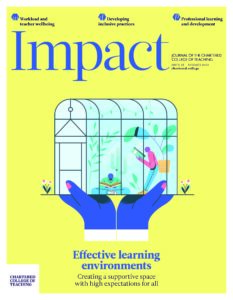A reflection on how and why we changed our Key Stage One learning environments

Mary Norton, Key Stage 1 Team Leader, Warden House Primary School, UK
Introduction
The more we considered the transition – from Reception to Year 1 – of a small group of children with specialist support, the more we questioned our practice for all children in our setting and researched the need for change. This article is a reflection that will outline the key pieces of research that led to a shift in our practice in all Key Stage 1 classes. It will discuss key changes that were put in place, the impact of these changes and practical suggestions to support teachers in a similar position. Engagement with a robust research cycle based on the model by Graham Chisnell (Irresistible Learning, 2021) has led us to establish a high-quality learning environment that is inclusive and supportive for all children, from Reception to Year 2. The focus of the article will discuss the process of change and the impact of engagement with research to drive the change forwards.
Developing a play-based learning environment
Picture this: data is strong; your OfstedThe Office for Standards in Education, Children’s Services and Skills – a non-ministerial department responsible for inspecting and regulating services that care for children and young people, and services providing education and skills grading is outstanding; students seem happy. Our system appeared to work, so why change it? In May 2020, we reviewed our transitions from Reception to Year 1, focusing on a small group of children with complex needs who had worked within our Reception classes under the supervision of a dedicated teacher and teaching assistantAn adult that assists a teacher in the classroom. We concluded that if we placed them within the current Year 1 environment, we would set them up to fail. Fisher (2020) states: ‘Adult led learning without child led learning privileges the children who relish the more formal situation.’ Teaching in our school from Year 1 onwards pre-pandemic was formal, with several teacher inputs a day and whole-class follow-up activities for children sat statically at tables; there were few opportunities for play. In one study, Seleznyov (2019, p.38) found that, ‘Several [staff] felt that the formality of Year 1 was particularly detrimental to pupils with special needs and those from deprived backgrounds.’ This belief was mirrored by our staff. Our Year 1 classes and beyond spent most of their day participating in adult-led, formal learning. ‘Nowhere does the National Curriculum specify how the children have to be taught in order to achieve the expected outcomes, yet in many schools there is a belief that the time for play is over once children start in Year 1.’ (Quirk and Pettett, 2021, p. 30)
We needed to make changes to support the specialist provision group, but the effects of the first pandemic lockdown were also being felt – all children had missed many opportunities, especially time to develop speech and language and social skills. Therefore, we changed our Year 1 learning environments – to facilitate a play-based structure – from September 2020, not just for the benefit of the specialist group but for the benefit of all. A plan was developed with clear actions around assessments, transitions, parental involvement, resourcing, timetabling and development of spaces. We trained teachers and teaching assistants about the importance of play, we continually questioned our practice and our pedagogy, and we researched teaching and learning through play in Key Stage 1.
Chisnell (2021, p. 24) explains that ‘the cycle of research in school starts with defining an issue that is relevant to you and the organisation and that will potentially help to improve your practice or the practice of others’. Our identified issue was: ‘Did we have a pedagogy to develop opportunities and experiences where ‘all children have the chance to shine and thrive?’ (Fisher, 2020) We doubted whether it did. As recommended in step two of the research cycle (Chisnell, 2021), we developed a question to answer our issue: Did our environment support children in a developmentally appropriate way? During the year, we reviewed and discussed this question within our Key Stage 1 classes, and from September 2021 continued the development of play-based learning into Year 2, because we believe that ‘play is absolutely essential to learning because it is learning’ (Bottrill, 2020, p. 46).
In September 2021, staff in Key Stage 1 began to research elements of play such as children’s perceptions of their learning, how to develop children’s speech and language through play, and the role of the adult in supporting play. Staff were given opportunities to share their findings and work together to overcome barriers.
Here are some practicalities to consider:
- Spaces: Develop areas inside and out to enable children to independently access resources. Use your outdoor space to develop gross motor skills, resilience and teamwork.
- Furniture: Do you need a table and chair for every child? Removing some tables freed up space to create areas such as construction and small world.
- Adults: Who will support play and how? Who needs training and about what?
- Timetables: Do you need morning and/or afternoon breaks? Do they interrupt the flow of in-depth play? What will the balance of adult-led and child-led activities look like?
- The National Curriculum: Which objectives can be taught through the environment and which need discrete teaching?
- Coaching and research: Use them to support staff in developing their practice.
- Evidence: What will you and the children record and how? What evidence of learning will you be able to share with subject and senior leaders?
- Find other like-minded schools and practitioners and connect with them.
Conclusion
There have been obstacles and setbacks along the way, but by involving the whole team in the process of change, they have become advocates for this approach. The positives far outweigh any negatives. Developing areas of research with staff enables them to have ownership of the change, and by training staff across the whole school, they understand and support the change. ‘High level engagement is what gives you the potential for high level attainment.’ (Bryce-Clegg, 2019) Staff have noted increased happiness, engagement and independence in the children, especially those from more vulnerable backgrounds. It has been and continues to be an exciting time of change. We are certain that the changes we have made and continue to make have had a positive impact on the quality of education that we offer. The high-quality learning environment we have now is inclusive and supportive for all, and we believe that this approach will improve the children’s outcomes. We provide developmentally appropriate opportunities for children who are enthusiastic, resilient and engaged in their learning, whatever their background or ability.
- Bottrill G (2020) School and the Magic of Children. London: Corwin Ltd – Sage Publications Ltd
- Bryce-Clegg A (2019) Transition into Key Stage 1 – A blog and a book. ABCdoes.com, June 22, 2019 Available at: https://abcdoes.com/abc-does-a-blog/2019/06/22/transition-into-key-stage-one-a-blog-and-a-webinar/ (accessed 5 April 2022).
- Chisnell G (2021) Irresistible Learning: Embedding a Culture of Research in Schools. Woodbridge: John Catt Educational Ltd.
- Fisher J (2020) The importance of play in KS1. Foundation Stage Forum, July 16, 2020. Available at: https://eyfs.info/articles.html/primary/the-importance-of-play-in-key-stage-1-r321 (accessed 17 March 2022).
- Quirk S and Pettett V (2021) Let Me Be Five. Abingdon: Routledge.
- Seleznyov S (2020) Researching play-based pedagogies in Year 1. Impact 10: 37–40.










